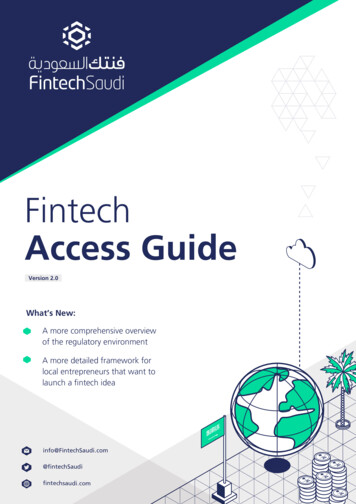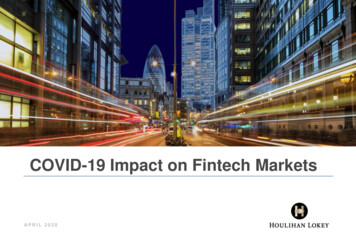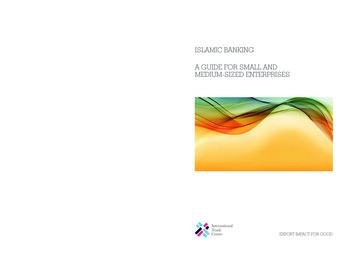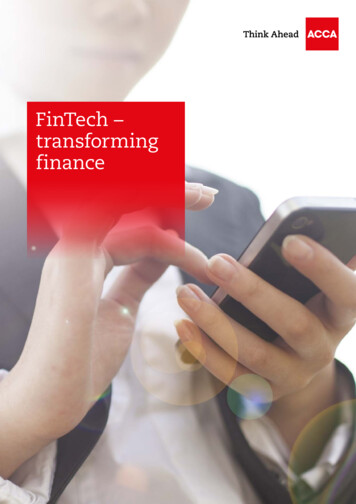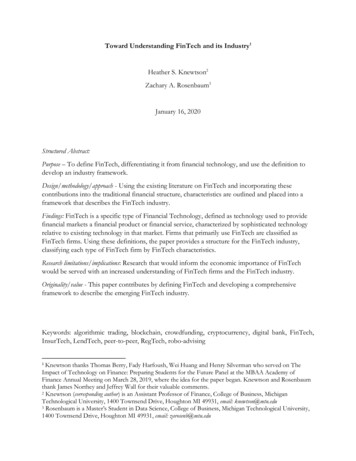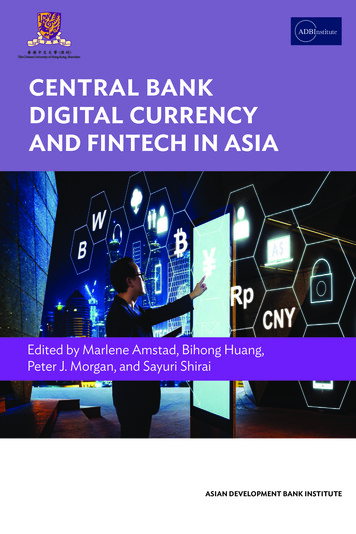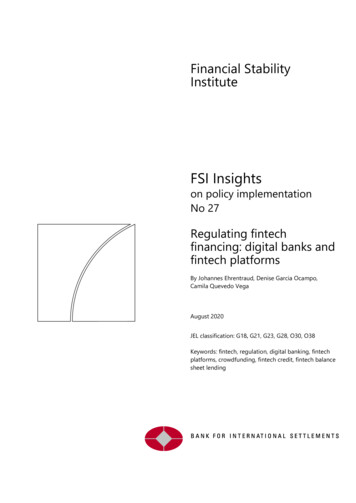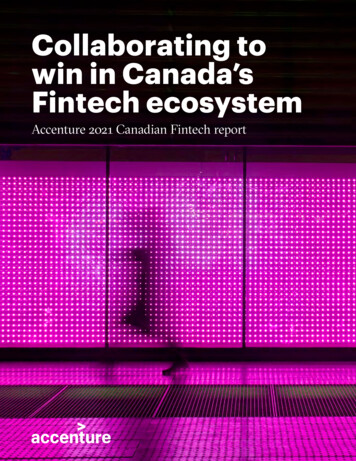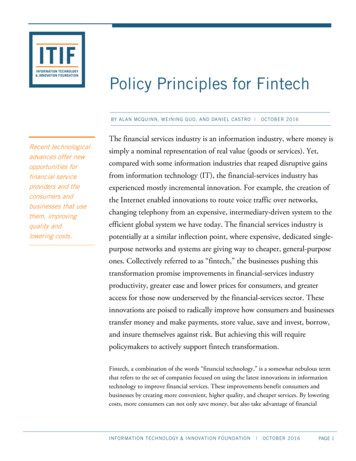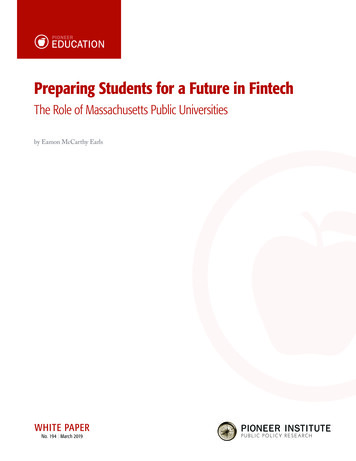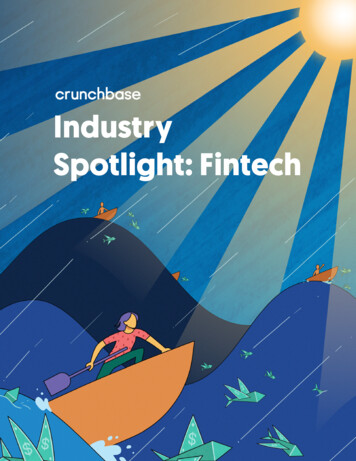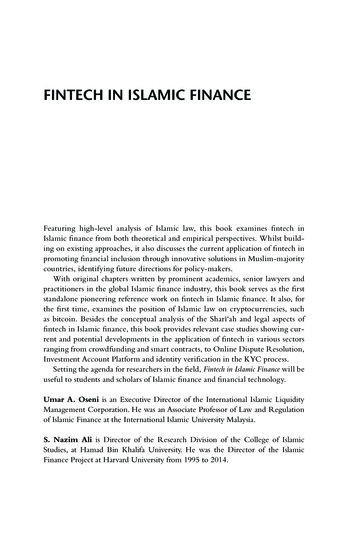
Transcription
FINTECH IN ISLAMIC FINANCEFeaturing high-level analysis of Islamic law, this book examines fintech inIslamic finance from both theoretical and empirical perspectives. Whilst building on existing approaches, it also discusses the current application of fintech inpromoting financial inclusion through innovative solutions in Muslim-majoritycountries, identifying future directions for policy-makers.With original chapters written by prominent academics, senior lawyers andpractitioners in the global Islamic finance industry, this book serves as the firststandalone pioneering reference work on fintech in Islamic finance. It also, forthe first time, examines the position of Islamic law on cryptocurrencies, suchas bitcoin. Besides the conceptual analysis of the Shar ī‘ah and legal aspects offintech in Islamic finance, this book provides relevant case studies showing current and potential developments in the application of fintech in various sectorsranging from crowdfunding and smart contracts, to Online Dispute Resolution,Investment Account Platform and identity verification in the KYC process.Setting the agenda for researchers in the field, Fintech in Islamic Finance will beuseful to students and scholars of Islamic finance and financial technology.Umar A. Oseni is an Executive Director of the International Islamic LiquidityManagement Corporation. He was an Associate Professor of Law and Regulationof Islamic Finance at the International Islamic University Malaysia.S. Nazim Ali is Director of the Research Division of the College of IslamicStudies, at Hamad Bin Khalifa University. He was the Director of the IslamicFinance Project at Harvard University from 1995 to 2014.
FINTECH IN ISLAMICFINANCETheory and PracticeEdited by Umar A. Oseni and S. Nazim Ali
First published 2019by Routledge2 Park Square, Milton Park, Abingdon, Oxon OX14 4RNand by Routledge52 Vanderbilt Avenue, New York, NY 10017Routledge is an imprint of the Taylor & Francis Group, an informa business 2019 selection and editorial matter, Umar A. Oseni and S. Nazim Ali;individual chapters, the contributorsThe right of Umar A. Oseni and S. Nazim Ali to be identified as theauthors of the editorial material, and of the authors for their individualchapters, has been asserted in accordance with sections 77 and 78 of theCopyright, Designs and Patents Act 1988.All rights reserved. No part of this book may be reprinted or reproducedor utilised in any form or by any electronic, mechanical, or othermeans, now known or hereafter invented, including photocopying andrecording, or in any information storage or retrieval system, withoutpermission in writing from the publishers.Trademark notice: Product or corporate names may be trademarksor registered trademarks, and are used only for identification andexplanation without intent to infringe.British Library Cataloguing-in-Publication DataA catalogue record for this book is available from the British LibraryLibrary of Congress Cataloging-in-Publication DataA catalog record has been requested for this bookThe views expressed in this book are those of the respective authorsand do not necessarily reflect the views or policies of any organisationthat any of the editors are currently serving or have served before inwhatever capacity.ISBN: 978-1-138-49479-4 (hbk)ISBN: 978-1-138-49480-0 (pbk)ISBN: 978-1-351-02558-4 (ebk)Typeset in Bemboby Deanta Global Publishing Services, Chennai, India
CONTENTSList of figuresList of tablesAcknowledgementsList of abbreviationsList of contributorsPART IINTRODUCTION1 Fintech in Islamic financeUmar A. Oseni and S. Nazim AliPART IIFINTECH AND FINANCIAL INTERMEDIATION2 Fintech: The opportunity for Islamic financeHarris Irfan and Daniel Ahmedviiiixxxiixiv1317193 Implications of technological advance for financialintermediation in Islamic financeRodney Wilson334 Fintech in Islamic finance: From collaborative finance tocommunity-based financeCelia de Anca47
vi Contents 5 Financial intermediation, fintech and Shar ī‘ah complianceShariq Nisar and Umar Farooq646 E-commerce and Islamic financial intermediationHafis Bello75PART IIISETTING THE SHARĪ‘AH PARAMETERS7 Fintech in the light of maqāsid al-Sharī‘ahMustafa Omar Mohammed and Mohamed Cherif El Amri91938 Fintech and Islamic finance: Setting the Shar ī‘ah parametersMohamad Akram Laldin and Hafas Furqani1139 Currency in Islamic Law: A Shar ī‘ah analysis of bitcoinMufti Faraz Adam and Mufti Abdul Kadir Barkatulla12010 Crowdfunding in Islamic Finance: Ensuring properShar ī‘ah oversightMuhammad Al-Amine Muhammad Al-BashirPART IVLEGAL AND REGULATORY ISSUES11 The regulation of fintech and cryptocurrenciesNafis Alam and Abdolhossein Zameni13215715912 Fintech in Islamic finance: Business models and the needfor legal solutionsMichael Gassner and Jonathan Lawrence17413 Blockchain technologies and the prospects of smartcontracts in Islamic financeVolker Nienhaus18314 The potentials of smart contract in Islamic trade financeLeisan Safina and Umar A. Oseni215
Contents PART VCASE STUDIES: FROM CONCEPT TO APPLICATIONvii23315 The emergence of Islamic crowdfunding platforms:A case study of Ethis VenturesAhmad A. Sabree and Umar Munshi23516 The Investment Account Platform: A practical applicationof fintech in MalaysiaNoor Suhaida binti Kasri and Marjan Muhammad24917 Integrating waq f crowdfunding into the blockchain:A modern approach for creating a waq f marketMagda Ismail Abdel Mohsin and Aishath Muneeza26618 Blockdentity: A future beyond digital identityIshaq Mustapha Akinlaso, Ibrahim Opeyemi Adediran,Abdoulaye Kindy Diallo and Ziyaad Mahomed19 Banking on ICT: The relevance of online disputeresolution in the Islamic banking industry in MalaysiaUmar A. Oseni and Sodiq O. OmoolaPART VIFUTURE DIRECTIONS20 Current trends and future impacts of fintech in IslamicfinanceSirajulhaq Yasini and Marifatulhaq YasiniIndex281303325327337
FIGURES4.1 Community banking 6.1 Retail e-commerce sales worldwide from 2014 to 2021(in billion US dollars) 6.2 Global B2B e-commerce gross merchandise volume(GMV) from 2013 to 2017 (in billion US dollars) 7.1 A l-Ghazali’s theoretical framework of maqāsid7.2 Sekaran’s operationalisation method7.3 Fintech maqāsid framework (FMF)15.1 EthisCrowd mudārabah model 201716.1 General structure of investment account platform18.1 Evolution of human identity18.2 Trust, identity and transaction18.3 Traditional identity system18.4 Largest data-breach cases 2008–201818.5 Blockdentity snapshot18.6 Personality identity information exposure:Traditional system vs Blockdentity 18.7 Blockdentity: Marketplace overview19.1 Proposed Islamic finance ODR 317
TABLES4.1 Components of fintech in Islamic finance5.1 Fintech scope in the financial sector5.2 Potential direction and scope for fintech in enhancingShar ī‘ah compliance7.1 The dimensions of the essential of Māl7.2 The relationships between the dimensions and elementsof the essential of Māl7.3 The relationships between the elements of theessential of Māl7.4 The relationships between the dimensions, elements andproposed indicators of the essential of Māl16.1 Ventures funded through IAP (as at December 2017)16.2 Brief information on Kobimbing Venture16.3 Brief information on PKTB Venture16.4 Brief information on ICT Zone Venture16.5 Volume of fundraising via IAP (as at December 2017)576872106108109110254255257258261
ACKNOWLEDGEMENTSThe whole idea of coming up with a book that brings together different conceptsand case studies on fintech in Islamic finance started after the successful stagingof the 11th LSE-HBKU Workshop on “Fintech and Islamic Finance: ApplyingHiyal & Makharij and other Islamic Principles”. The workshop was held on 23February 2017 at the London School of Economics (LSE). Leading finance, legaland Shar ī‘ah experts attended the workshop at LSE which was moderated byProfessor Frank Vogel. We would like to thank the moderator, participants andthe host, LSE.After the workshop, which was very engaging and rich in discussion, wedecided to invite some key contributors from across the world who are accomplished professionals to contribute to a book believed to be the first of its kind.Some of the chapters in this book were developed later based on preliminarywritten comments submitted for the workshop. From that moment onwards, wewidened the potential contributors’ base to include other leading authors.This painstaking effort in identifying leading authors for this pioneeringproject is unprecedented; and we would like to thank all contributors for theirsupport and cooperation throughout the editing process. Despite the numerousiterations with the authors and scores of correspondences to ensure all chapterswere turned in within a reasonable time, we found the authors to be very cooperative and responsive. We are convinced that this would not have been possiblewithout the constant reminders from the publisher to meet the timeline for thebook. Specifically, we appreciate the efforts of one of the contributors, Dr. SodiqOmoola, and a research scholar, Abdurahman Jemal Yesuf, both of whom helpedat different stages in ensuring all chapters comply with the standard referencingstyle in a consistent manner.It is worth noting that Chapter 19 is reprinted by permission of Taylor &Francis. The original publication appeared as: “Banking on ICT: The relevance
Acknowledgements xiof online dispute resolution in the Islamic banking industry in Malaysia” byUmar A. Oseni & Sodiq O. Omoola Information & Communications Technology LawVol 24:2 pp. 205–223 (2015).We would like to thank the Publisher, Taylor & Francis, and its editors, particularly the fantastic Acquisition Editor, James “Joe” Whiting who understoodthe urgent need for the book from the very moment we introduced the topicto him. We wish to formally acknowledge Taylor and Francis Group, EthisVentures, and IAP Integrated Sdn Bhd, whose materials were used in some ofthe chapters of the book.We hope these humble efforts will help to spur further research in this uniquefield and trigger further innovative fintech products, services and solutions in theglobal Islamic financial services industry.Umar A. OseniS. Nazim Ali
TPCPUDAGDAODAPPSDFSADIAODLTDMCCECFAccounting and Auditing Organisation for Islamic FinancialInstitutionsAlternative Dispute ResolutionAfter Hijrah. This is used to denote the Islamic Calendar, whichcounting began in the year Prophet Muhammad migrated fromMakkah to MedinaArtificial IntelligenceAnti-Money LaunderingApplication Programming InterfaceAn automated teller machineBusiness-to-business or trade conducted between business via theinternet.Business-to-consumers or trade conducted between businessesand consumers via the internet.Bursa Suq Al-Sila – an online platform in Malaysia for managingcommodity murābahah transactionsBitcoinCommodity Murabahah Trading PlatformCentral Processing UnitDirected acyclic non-recursive graph for storing transactionsDecentralised autonomous organisationDecentralised applicationsDubai Financial Services AuthorityDecentralised intelligent autonomous organizationDistributed Ledger TechnologyThe Dubai Multi Commodities CentreEquity crowdfunding
Abbreviations xiiiExpected Profit RateEnvironmental, Social and GovernanceErnst & YoungMalaysia’s Fully Automated System for issuing/TenderingGoogle, Amazon, Facebook and AppleGulf Cooperation CouncilGross Domestic ProductThe European Union General Data Protection RegulationGlobal Positioning SystemHigh Net Worth InvestorsA simple but universal mechanism for retrieving resourcesInvestment Account PlatformInitial coin offering or initial currency offering (sometimes called“initial public coin offering”)IFSBIslamic Financial Services BoardICTInformation and Communications TechnologyIOTInternet of ThingsIOTAA Distributed Ledger Technology developed by the IOTAFoundationKYCKnow Your CustomerLEILegal entity identifierMEPSMalaysian Electronic Payment SystemMSMESMicro, Small and Medium EnterprisesODROnline Dispute ResolutionP2PPeer-to-PeerPBUHPeace be upon him [Prophet Muhammad]R&DResearch and developmentREGTECH Regulatory technologyRELABRegulatory laboratoryROIReturn on InvestmentS&PRating agency, Standard and Poor’sSDGUnited Nations Sustainable Development Goals 2030SMESmall and medium enterprisesSPVSpecial Purpose VehiclesSRISocially Responsible Investing (or Investments)SSIDSelf-Sovereign IdentityURISA way to identify O
CONTRIBUTORSAbdolhossein Zameni is a Lecturer at Henley Business School, University ofReading Malaysia. He obtained a BSc in Industrial Engineering at MazandaranUniversity of Science and Technology in Iran. In 2006, in order to pursue hiseducation in an international environment, he moved to Malaysia and obtainedhis MBA in Finance at Multimedia University. In 2014, he was awarded a PhD inFinance by the National University of Malaysia (UKM). Dr. Zameni has experience in the delivery of educational programmes at undergraduate level, as well asbusiness experience within the fields of finance, accounting and industry. His areaof research revolves around IPO and fintech regulatory issues.Abdoulaye Kindy Diallo is currently exploring application of blockchain technol-ogy in the financial services industry. He holds a dual master’s degree in Scienceand Islamic Finance and a Bachelor’s degree in Computer Science. With nearly adecade experience in the IT industry, he works to bridge the gap between IT andIslamic Finance.Ahmad A. Sabree is the former Head of Business and Sharī‘ah Development andcrowdfunding specialist for Ethis Ventures, and is from Atlanta, Georgia. He holdsa BSc in Usul al-Fiqh (Sharī‘ah) and an MSc in Islamic Banking and Finance, bothfrom International Islamic University Malaysia (IIUM). His thesis was on the topicof “Adapting Crowdfunding for SME Finance in Malaysia”. His research led him tobecome a specialist and consultant in crowdfunding. Ahmad provided Sharī‘ah andcrowdfunding consultation to lawyers structuring the first Islamic P2P crowdfunding contracts in Malaysia and was instrumental in coordinating Sharī‘ah discussionsand decisions with leading international Sharī‘ah advisories to acquire the associated Pronouncements of Shariah compliance.
Contributors xvAishath Muneeza is an Associate Professor at the International Centre forEducation in Islamic Finance (INCEIF), Kuala Lumpur, Malaysia. She is the firstfemale Deputy Minister of Ministry of Islamic Affairs and is the former DeputyMinister of Ministry of Finance & Treasury of the Republic of Maldives. She isalso the chairwoman of Maldives Centre for Islamic Finance. She is consideredto be the founder of Islamic finance in the Maldives. Her contribution to Islamicfinance includes structuring of the corporate sukuks and sovereign private sukukof the country, including the Islamic treasury instruments. She also drafted theIslamic Capital Market framework of the country and has been the only registered Sharī‘ah adviser for the Islamic capital market in the country since 2013. Sheplayed a key role in setting up the Tabung Haji of the Maldives, the Maldives HajjCorporation, and was its first chairperson. She sits on various Shariah advisorybodies nationally and internationally and is chairman for many of these Shariahadvisory bodies, including the apex Shariah Advisory Council for capital marketin the Maldives. She has assisted more than 11 institutions to offer Islamic financialproducts/services.Celia de Anca is currently the Director of the Saudi-Spanish Centre for IslamicEconomics and Finance at IE Business School, Spain. She was previously theDirector of Corporate Programmes at the Euro-Arab Management School (EAMS),Granada, Spain. She has also worked for the Fundación Cooperación Internacionaly Promoción Ibero-América Europa (CIPIE) and at the International Division ofBanco de Santander. She has a master’s degree from the Fletcher School of Law andDiplomacy (Boston, MA), and from the Universidad Politécnica de Madrid. Sheholds a degree and PhD from the Universidad Autónoma de Madrid, with a comparative thesis on Islamic, ethical/ecological investment funds and on the LondonMarket. She is the Author of Beyond Tribalism, 2012, and co-author of ManagingDiversity in the Global Organization, 2007. She has had articles published in specialised journals, in addition to regular articles in the press. She was an external advisorof the Merrill Lynch’s Diversity & Inclusion Council up to 2009. Ms. de Anca isfluent in Spanish, English, French and Arabic.Daniel Ahmed is a Senior Analyst at the Prime Minister’s Office of the UnitedArab Emirates, and was previously part of the fintech practice at Deloitte. Daniel isa co-founder of the Islamic Finance & Ethics Society at the University of London,and is currently working with Finocracy to explore and develop solutions that willdisrupt the Islamic finance industry. He holds a degree in Political Economy atKing’s College London.Hafas Furqani is currently a lecturer at the Faculty of Islamic Economics andBusiness, State Islamic University of Ar-Raniry, Banda Aceh, Indonesia. Hereceived his PhD in Economics (2012) as well as Master of Economics (2006),from the Department of Economics, International Islamic University Malaysia. HisBachelor’s degree is in Sharī‘ah Mu’amalah from the State Islamic University (UIN)
xvi Contributors Syarif Hidayatullah, Jakarta (2002). Hafas has extensively written and presentedpapers in the areas of Sharī‘ah, Islamic economics, banking and finance in academicjournals and conferences. His paper entitled “Theory appraisal in Islamic economicmethodology: purposes and criteria”, published in Humanomics (2012), was chosen asa Highly Commended Award Winner at the Literati Network Awards for Excellence2013. His PhD thesis “The Foundations of Islamic Economics: A Philosophical Explorationof the Discipline” was awarded Gold Medal at the 2012 International Islamic UniversityMalaysia Research, Invention and Innovation Exhibition (IRIIE 2012).Hafis Bello is a Fintech Analyst, corporate strategist and experienced researcher.He has distinguished himself as a forward-looking executive with great potentialin identifying opportunities, increasing productivity and excellent teamwork abilities. Hafis worked at Centre for Islamic Finance at HBKU, Qatar. Prior to this, hewas a Business Development Executive at SystemSpecs where he was responsible for business strategy and product support for the FinTech solution, REMITA,for microfinance banks and pension funds. He is a Council Member at GersonLehrman Group (GLG), USA. Hafis founded Leeds Interlinks Limited in 2013 andco-founded Carry-On Inc. in 2017. He is an Associate Fellow of the Institute ofIslamic Banking & Insurance (IIBI), London. He coordinates training and motivation programmes aimed at unlocking potential and has written articles on selfdevelopment initiatives. Some of his academic research in sustainable development,finance and social sciences are published in reputable journals. He has completedhis coursework towards a PhD degree in Islamic Banking and Finance.Harris Irfan is Chairman of the UK Islamic FinTech Panel and a Partner atGateway LLP, the professional services firm. He is also the Managing Directorof Cordoba Capital, the Islamic finance and fintech consulting firm. Harris cofounded Deutsche Bank’s world leading Islamic finance team and was CEO of itsIslamic finance subsidiary. He was subsequently appointed global head of Islamicfinance at Barclays, and then Head of Investment Banking at EIIB/Rasmala. He isthe author of Heaven’s Bankers: Inside the Hidden World of Islamic Finance and holds adegree in Physics from the University of Oxford, UK.Ibrahim Opeyemi Adediran is a Chartered Accountant and Advance CertifiedIslamic Finance Executive. He has more than a decade of experience in auditing,commercial and educational sectors. He is a consultant for companies and private individuals and a trainer on IFRS, accounting, internal control and regulatorycompliance.Ishaq Mustapha Akinlaso is a CIAWM doctoral scholar specialising in InnovativeFinancial Instruments for Infrastructure Development at the Global University forIslamic Finance (INCEIF), Malaysia. Mustapha is the project lead at Blockdentity,a next generation fintech player that is focused on revolutionising legacy identitysystems using blockchain and integrated technologies.
Contributors xviiJonathan Lawrence is a Finance partner in the London office of the global law firmK&L Gates, where he has held this position since 2005. He plays a leadership role inthe firm’s Islamic Finance practice, Legal 500 UK Islamic Finance. K&L Gates LLPis singled out for its “seamless global service”. Its cross-office team includes Londonbased Jonathan Lawrence, who has “stunning in-depth knowledge of structuringshari’ah-compliant transactions”. One client describes him as a “real breath of freshair”, saying: “What has impressed me the most is his ability to act very quickly whenrequired, with a real sense of urgency and commercial awareness often lacking inother firms.” Lawrence writes regularly on fintech issues for www.fintechlawblog.com. He is a member of the Editorial Board of the Journal of International Banking &Financial Law and sits on the Consultation Board of Practical Law Finance.Leisan Safina is a Treasury Officer in Hayat Kimya, Russia. She was formerly anintern at the International Islamic Corporation for Development of the PrivateSector (ICD), Islamic Development Bank Group, Kuala Lumpur office. Shereceived her degree from Kazan Federal University (Russia) and later successfullycompleted her master’s degree in Islamic Banking and Finance from InternationalIslamic University Malaysia. Her area of interests is Islamic banking and finance,and fintech, particularly blockchain applications, in Islamic finance. She has presented papers in conferences across the world including: “Utilizing BlockchainTechnology for Post-Trade Securities Settlement: A Framework for Islamic CapitalMarkets in the GCC Region” in Gulf Research Meeting 2018 at the University ofCambridge; and “Utilizing Blockchain Technology for Post-Securities Settlement:A framework for Islamic Capital Market in Iran” in the 10th International Forumon Islamic Capital Markets, Tehran, Islamic Republic of Iran.Magda Ismail Abdel Mohsin is an Associate Professor at the International Centrefor Education in Islamic Finance (INCEIF), the Global University of IslamicFinance, Malaysia, teaching Islamic economics and finance. She is the author ofthe two books on waqf published by Pearson, and an editor of a recent book published by Palgrave. She is also the recipient of four awards: Outstanding WomenAchiever for the contribution and achievement in the field of Islamic Economicsand Finance, given under the seal of Venus International Foundation, India, March2016; Recognition for Best Research Efforts Award, awarded by InternationalCouncil of Islamic Finance Educators (ICIFE) in August 2015; Best/outstanding paper award for the paper, “Financing through cash-waqf: A new innovationfor the 21st Century” by the Emerald Group, 2013; Best Book written on waqfin 2014 (Corporate Waqf from Principle to Practice) selected by Sheikh Rashid binDail Research Chair for Endowments Studies, Imam Muhammad ibn Saud IslamicUniversity Riyadh, Saudi Arabia.Marifatulhaq Yasini is Sharī‘ah Executive at CIMB Islamic Bank Berhad. Hereceived his Bachelor Degree in Law and Sharī‘ah from International IslamicUniversity Malaysia.
xviii Contributors Marjan Muhammad is currently the Head of Research Quality Assurance Officeat the International Shari’ah Research Academy for Islamic Finance (ISRA),Kuala Lumpur, Malaysia. She was previously the Director of Research at ISRA.Prior to joining the organisation, she was a tutor at the Faculty of Law andSyari’ah, Islamic Science University of Malaysia (USIM). Dr. Marjan is currentlya member of the Shari’ah Advisory Committee at Malaysia Building SocietyBerhad (MBSB), Malaysia. She also sits as a member of the Shari’ah Committeeat Maybank Islamic Berhad, Malaysia and SME Bank, Malaysia. She obtained herDoctoral and Master’s degrees in Islamic Revealed Knowledge and Heritage (Fiqhand Usul al-Fiqh) from the International Islamic University Malaysia (IIUM),after graduating from the same university in 1998 with her Bachelor’s degree.Her research interests in Islamic finance focus on the Islamic capital market. Sheis the editor of textbooks on the Islamic Capital Markets: Principles and Practices(2015), Islamic Financial System: Principles and Operations (2nd ed, 2016), and Sukuk:Principles and Practices (2017).Michael Gassner is Editor of IslamicFinance.de and Head of Islamic finance ofa Swiss private bank and has been based in Switzerland since 2008. Michael isa member of the Sharia Board of Bosna Bank International in Sarajevo, and amember of the advisory board of the World Congress of Muslim Philanthropistsin Chicago. He also teaches Islamic law, finance and economics at Geneva BusinessSchool and University of Lausanne.Mohamad Akram Laldin is currently the Executive Director of InternationalSharī‘ah Research Academy for Islamic Finance (ISRA) and Professor atInternational Centre for Education in Islamic Finance (INCEIF), Malaysia.Prior to joining ISRA he was an Assistant Professor at the Kulliyah of IslamicRevealed Knowledge and Human Sciences, International Islamic University,Malaysia (IIUM). In the period 2002–2004, he was a Visiting Assistant Professorat the University of Sharjah, Sharjah, United Arab Emirates. At present, he isthe Member of Bank Negara Malaysia Sharī‘ah Advisory Council, Chairman ofSharī‘ah Board of Employees Provident Fund Malaysia (EPF), Member of ShariahSupervisory Council of Labuan Financial Services Authority (FSA), Member ofShariah Advisory Board ZI Shariah Advisory, Member of Shariah Advisor of DarAl Takaful, Dubai, Member of Shariah Advisory Board, Eco Islamic Bank, Republicof Kyrgstan, Member of Shariah Advisory Council International Islamic FinancialMarket (IIFM),Bahrain, Member of Shariah Advisor of National Takaful CompanyPSC, Watania, Abu Dhabi, Member Financial Regulation Advisory Council ofExperts (FRACE), Central Bank of Nigeria, Member of The Panel of RecognizedInternational Market Experts in Finance (“P.R.I.M.E. Finance”) and other Boardslocally and internationally. He is the recipient of the Zaki Badawi Award forExcellence in Shariah Advisory and Research. Recipient of the Most OutstandingIndividual Contribution to Islamic Finance during KLIFF 2016 organised byCERT. Winner of the 2017/1439H Malaysian Islamic Personality Award conferred
Contributors xixby The Government of Malaysia on the occasion of the birthday of the ProphetMuhammad (peace be upon him).Mohamed Cherif El Amri is an Assistant Professor at the Faculty of Business andManagement Sciences and specialises in Islamic Economics and Finance, at IstanbulSabahattin Zaim University, Turkey. He completed his Bachelor’s degree in IslamicStudies from Ibn Tofail University in Morocco. He had his Master’s in IslamicJurisprudence and its principles, while his PhD was in Islamic banking and financefrom International Islamic University Malaysia. He worked as an intern at severalIslamic financial institutions, such as the Islamic Capital Market Business Group,Securities Commission, Kuala Lumpur, Malaysia and Maybank Islamic. He workedas a researcher at the IIUM Institute of Islamic Banking and Finance, Malaysia. Hewas an Associated Consultant at Amanie Advisors, Kuala Lumpur, Malaysia. He is amember of the Scientific Committee of the International Review of EntrepreneurialFinance Journal and Journal of Islamic Economics and Finance. He has multiple researchpublications and presentations in the field of Islamic Finance and Economics.Mufti Abdul Kadir Barkatulla is a prominent Sharia law expert based in the UKwith a background in social, Muslim community work, economics and finance.He was trained extensively in Islamic and modern education systems in India andthe UK. Mufti has contributed to the British Muslim community as an Imam,Lecturer, Shariah Judge, Developer of Islamic Law information databases, Anchorof Community Television, Media Commentator, Shariah Advisor of Islamic Banksand Funds in Europe and Asia.Mufti Faraz Adam is the Director of Amanah Finance Consultancy Ltd, a platform for specialist global Shariah advisory services based in the UK. He has spentalmost a decade studying Islamic law. He completed his Islamic studies in the sixyear Alimiyyah degree at Darul Uloom Leicester. He then went on to specialise inIslamic law and graduated as a Mufti in South Africa at Darul Iftaa Mahmudiyyah,Durban, super-specialising in Islamic finance during his studies. Mufti Faraz wenton to complete a Master’s Degree in Islamic Finance, Banking and Managementat Newman University in 2017. During the past few years, he has attained various industry qualifications. Mufti Faraz is a Shariah advisor at a number of Islamicfinancial institutions in the UK, Bahrain, Dubai, Singapore and Malaysia.Muhammad Al-Amine Muhammad Al-Bashir is Sharī‘ah Advisor at IslamicCorporation for the Development of the Private Sector, Islamic DevelopmentBank, Jeddah, Saudi Arabia. He was the Group Head of Sharī‘ah Compliance ofBank Alkhair. Prior to joining IDB he was at Bank Alkhair and the InternationalIslamic Financial Market (IIFM). He was also a part-time Lecturer at the Facultyof Laws International Islamic University Malaysia; Ibn Sina Institute of Technology(Malaysia); the Matriculation Centre International Islamic University (Malaysia),the Bahrain Institute of Banking and Finance; the Kingdom University (Bahrain);
xx Contributors and The Open Universi
4.1 Components of fintech in Islamic finance 57 5.1 Fintech scope in the financial sector 68 5.2 Potential direction and scope for fintech in enhancing Sharī‘ah compliance 72 7.1 The dimensions of the essential of Māl 106 7.2 The relationships betwee
